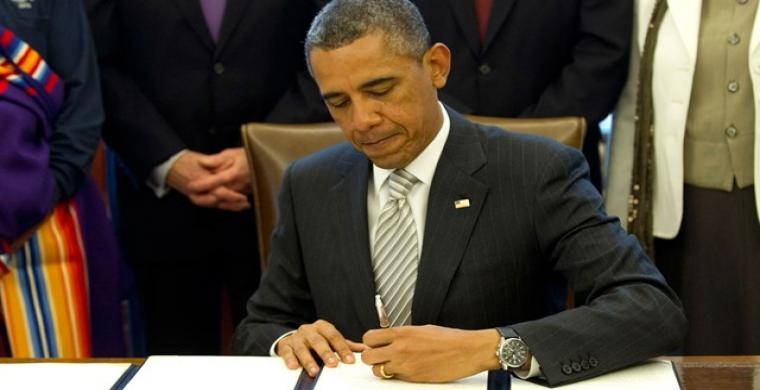New Executive Orders on LBGT Discrimination Won't Exempt Religious Orgs
But Obama won't withdraw memo on religious discrimination.
By Ruth Moon
www.christianitytoday.com
July 21, 2014
An executive order President Obama signed Monday prohibiting sexual orientation discrimination in federal hiring does not exempt faith-based organizations.
The executive order amends a 1965 order prohibiting some forms of discrimination by federal contractors. The old text forbade contractors from discriminating "against any employee or applicant for employment because of race, color, religion, sex, or national origin." Obama's revision adds "sexual orientation" and "gender identity" between "sex" and "national origin."
The order accomplishes part of what legislators attempted to accomplish in passing the Employment Non-Discrimination Act (ENDA), a bill that passed the Senate earlier this session and now languishes in the House. While Obama will not include a new exemption for faith-based organizations, he will let stand a 2007 exemption memo from the federal attorney general's office. That memo says the Religious Freedom Restoration Act "is reasonably construed" to exempt World Vision (and other religious organizations that administer federal funds through social services programs) from religious nondiscrimination requirements on other federal grantees.
The World Vision memo will be helpful, though religious organizations would be better protected if the forthcoming executive order included a religious exemption, said Douglas Laycock, a professor of law and religious studies at the University of Virginia.
The ENDA currently before Congress would prohibit most employers in the country from sexual orientation-based discrimination but would exempt religious organizations and the military. Nearly every Congress for the past decade has dealt with a similar bill in some fashion, according to Human Rights Campaign, but so far none has passed into law. In 1998, President Bill Clinton signed a related and limited executive order prohibiting sexual orientation-based discrimination in some competitive services of the federal civilian workforce.
Obama announced the pending executive orders June 16. One prohibits discrimination by sexual orientation for federal contractors, and one protects federal employees from gender-identity discrimination, according to a transcript of a Pride Month celebration later that month.
Many of the federal contractors the first executive order targets are religious nonprofits such as World Vision, World Relief, and Catholic Charities. The executive order could pit the president's interest in antidiscrimination against religious organizations' rights to hire based on religious preference, which can include not hiring individuals in same-sex relationships.
At stake is a small but important move in one direction or another indicating how the government stacks sexual identity against religious rights, said David Skeel, professor of corporate law at the University of Pennsylvania.
"The Constitution places a very high emphasis on religion as an important value. The one value that's on the same level in the constitution at this point is racial equality," he said. "The question is: Are there other values that are comparable?"
Obama's language choice indicates which right—sexual identity or religious freedom—he holds more strongly, Skeel said.
"[Going] forward with anything other than an order with exemptions built into it suggests that, on balance, sexual orientation is his stronger concern," he said.
Federal treatment of sexual identity sends a message about how the government views sexual identity in comparison with racial equality—protected in almost every context—and other strongly protected rights to equality, said Thomas Berg, a professor of law and public policy at the University of St. Thomas (Minn.).
"Each situation is now sort of a test move in a broader war or conflict," he said, and proponents of same-sex relationships could argue that the lack of exemption indicates a firm national policy against this form of discrimination.
END














